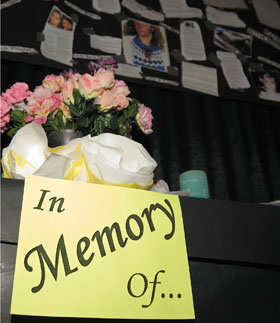  |
| HOME | THIS ISSUE | CALENDAR | GRANTS | BACK ISSUES | < BACK | NEXT > |
Event encourages students to reflect on discrimination, oppressionby Sherry Fisher - November 13, 2007 | ||||
| In one room, a person dressed in Ku Klux Klan robes stood in a corner holding a baseball bat. In another room, photographs of women who were victims of violent crimes, were arranged on a table. In yet another room, a student reflected aloud: “What’s wrong with me? I can’t do anything right” – while a recording repeated “Only selfish people think of suicide.” These were part of The Tunnel of Oppression, an eight-room multi-media, interactive, walk-through experience designed to increase awareness of acts of oppression. The event took place Nov. 6 and 7 in the Student Union. Guides led visitors, 10 at a time, through “rooms of oppression” that focused on topics including racism, substance abuse, STDs, violence against women, depression, eating disorders, and homophobia. The 45-minute experience included a “processing area,” where participants and a guide discussed the experience and shared thoughts about oppression. “The main objective of the program is to educate students about the oppressions that are occurring in society and around the world, and potentially on campus,” says Missy Korduner, program coordinator for the Honors Program. Dozens of departments, programs, and centers sponsored the Tunnel of Oppression. Although similar events are held at other college and universities, this is a first for UConn. “I’m hoping that the experience will open people’s eyes to oppression, especially those who have never experienced it or may not realize that it still occurs,” Korduner says. “Hopefully, they’ll start discussions in the community about why it is happening and what we can do to promote acceptance and tolerance.” Visitors moved quietly from room to room. In the area dealing with depression and suicide, guide Kathy Hampton emptied a backpack. It was full of bricks bearing words such as “lonely,” “worthless,” “shame,” “grief,” and “empty.” The bricks were passed around. “You never know what burdens someone is carrying around with them,” said Hampton, a licensed clinical social worker at Counseling and Mental Health Services. Empty cookie boxes, crumpled chip bags, and frozen food packages were strewn around a toilet in a room focusing on eating disorders.
A sign above a scale read, “I’m a Prisoner in My Own Body,” while large, cracked mirrors reflected the images. “Some people think that oppression of certain groups, such as women, or African Americans, was something that occurred in the past only,” Hampton says. “If you are not a member of an oppressed group, you may not be aware of the violence that still occurs daily to people.” She adds, “One room in the Tunnel, called “Everyday Violence Against Women,” graphically depicted the continuum of violence against women, starting with attitudes and name-calling. I have heard students say that they didn’t realize how the words they hear every day in popular music, on TV, and on campus perpetuate negative stereotypes and can lead to violence against women. Awareness is the first step in taking action to make change.” Ashley Widtfeldt, a student guide at the event, says the ideas showcased “occur, to some degree, in our lives on a daily basis and are usually overlooked. Something that one person thinks of as a simple joke may seriously affect another person.” She says the event allowed students to “get into the heads of the people suffering from these oppressions, and see the world from the other’s point of view.” Widfeldt is a senior, with a double major in journalism and communication sciences. She is also the Health and Human Services Coordinator for the Office of Community Outreach. Krupali Patel, a freshman majoring in business, came to the event as part of an FYE course. “I thought it was extremely good,” she says. “Everyone should check it out.” |
| ADVANCE HOME UCONN HOME |

